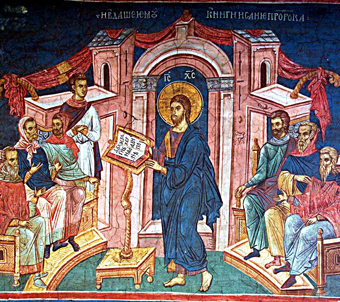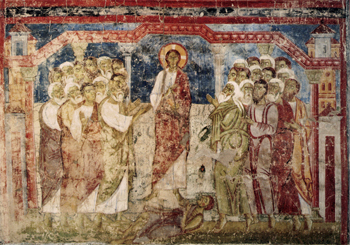For Sunday January 28, 2018
Fourth Sunday after the Epiphany
Lectionary Readings (Revised Common Lectionary, Year B)
Deuteronomy 18:15-20
Psalm 111
1 Corinthians 8:1-13
Mark 1:21-28
In this week’s lectionary reading from the Gospel of Mark, Jesus enters a synagogue, teaches with authority, astounds his listeners, casts out an unclean spirit, provokes more astonishment, and becomes famous throughout the land.
Can you relate? When was the last time an uninvited stranger walked into your church and took over the pulpit? How many exorcisms have you witnessed in the last month? How often do you spend Sabbath afternoons raving to your neighbors about miracles?
Let’s face it — this story is a tough one for us 21st century Christians, and if you’re anything like me, you might be tempted to pass it over as a colorful but irrelevant tale from ancient times. Fighting my own sense of futility, I spent the week trying to enter into the characters who populate St. Mark’s account of Jesus's eventful Sabbath. I imagined myself by turns as a member of the audience who heard Jesus speak, as the man possessed by the unclean spirit, and finally, as Jesus himself. Each of these role-plays pierced me in a different way. I heard questions worth asking, and assumptions worth challenging. If we’re willing to sit with some discomfort, I think we might find that this Gospel story speaks quite powerfully into our own lives, right here and right now.
Here is some of what I noticed:
The audience: we don’t know their names, ages, or backstories. All we know is that they showed up in the synagogue on the Sabbath, listened to Jesus teach, and found themselves “astounded” and “amazed.” I had to read the story half a dozen times before I realized something disconcerting: I can’t relate to these people. That is, I can’t remember the last time I was “astounded” and “amazed” by Jesus. Can you?
 |
According to Mark, the people who heard Jesus that day were amazed because he came with “a new teaching,” and “he taught them as one having authority.” The implication, of course, is that they were receptive to newness and open to amazement. Am I? Do I approach God, Scripture, church, and my faith with hope? With anticipation? Or do I come bored and cynical? All "been there, done that?" Do I sit in the pew on Sunday mornings wanting to contend with something new? Or do I expect to be coddled and commended?
Many of us live in cultures that are deeply (and perhaps rightfully) skeptical of institutions, leaders, and religious claims of all kinds. Many of us have good reasons to be weary and jaded when it comes to our spiritual lives; we have been hurt by authority figures we trusted. How, given these realities, can we still leave room for Jesus to show up and surprise us? How can we make sure we’re not so entrenched in our theological, liturgical, cultural, or political points of view that we fear and resist the new?
These are especially hard questions to ask ourselves if we’ve been Christians for a long time. The new becomes old. The fresh becomes familiar. The heart hunkers down for a comfortable and unvarying long haul, and we forget that Jesus came — and comes — to make all things new. The audience in Mark’s Gospel was “amazed and astounded” by the work of God because they allowed Jesus to be unfamiliar in their midst. This need not be the anomaly. It shouldn’t be. Jesus is amazing when we allow him to be. Amazement is the birthright of God’s children.
The man with the unclean spirit: I’ll get the obvious out of the way first and admit that I have no idea what the “spirit” in this story is. Some commentaries recast it as a mental illness, or as a medical condition like epilepsy. Others insist on it being an actual demon — a malevolent being that ensnares human souls. Still others argue that spirits in the New Testament are simply metaphors for anything that might “possess” or “control” us — anger, fear, lust, greed, hatred, envy, etc.
 |
I have no idea which of these explanations is true, and I’m not sure it matters. When I tried to imagine my way into the life of the man with the unclean spirit, what disturbed me most was not “who” or “what” the spirit actually was, but how utterly it ravaged the poor man whose body and mind it possessed. According to Mark's account, the man had no voice of his own — the spirit spoke for him. The man had no control over his body — the spirit convulsed him. The man had no community — the spirit isolated him. And the man had no dignity — the spirit dehumanized him.
Granted, this picture of “possession” is extreme, and I don’t claim for one moment to relate to it in its particulars. But all of us suffer (or have suffered) under the bondage of “spirits” that diminish, distort, and wound us. All of us know (or have known) what it’s like to lose agency, mobility, and dignity to forces too powerful for us to defeat on our own. And whether we regard those forces as spiritual, psychological, biological, metaphorical, or cultural, this Gospel story tells us true things about how “unclean spirits” affect and manipulate our souls.
In Mark’s story, the unclean spirit goes to the synagogue and listens to Jesus. It recognizes “the Holy One of God” before anyone else does. It calculates the stakes, realizes that Jesus’s presence signals its doom, and puts up a vicious fight before it surrenders.
Does any of this sound familiar? Sometimes our “unclean spirits” take up residence in our holy places. That is, we carry our destructive habits and tendencies right into our churches, our friendships, our families, and our workplaces. Sometimes our demons — our fears, our addictions, our sins, and our compulsions — recognize Jesus first because they know that an encounter with him will change everything. So they make us recoil as soon as he shows up in the guise of a loving friend, or a provocative sermon, or a pricked conscience. Sometimes our lives actually get harder when we move towards faith and healing, because unclean spirits always fight the hardest when their time is up.
What possesses us? What wreaks havoc in our hearts and minds? What distorts our humanity? These forces might not leave our lives without a fight, but the Jesus of Mark’s Gospel will do battle for us if we’ll let him. Will we?
Jesus: Mark never tells us what Jesus taught his audience that day. All we know is that he entered the temple, taught with an authority his listeners found astonishing, and underscored that authority with an exorcism. Is this a character we can even touch? Or is Jesus’s role in this story so completely enshrined in his divinity and power that there’s nothing for us to emulate?
 |
I think the story offers a couple of plausible takeaways. First, Jesus didn’t use his authority to self-aggrandize or to consolidate power. He used it only to heal, to free, to serve, and to empower those around him. Maybe this is precisely why his audience found him so compelling — his was the authority of a servant king. He had no political power. No earthly throne or kingdom to speak of. But he had an integrity and a consistency that compelled people to follow him.
Second, Jesus stepped directly into the pain, rage, ugliness, and horror at the heart of this story. He wasn’t squeamish. He didn’t flinch. His brand of holiness didn’t require him to keep his hands clean. He was in the fear, in the sickness, in the nightmare, ready to engage anything that diminished the lives of those he loved. Yes, he preached with great effectiveness to the faithful, but he also spoke the unclean spirit’s language, listened to its cries, and rebuked it for the sake of a broken man's health and sanity. Consider the question the spirit asked: “What have you to do with us, Jesus of Nazareth?” There’s only one answer, right? “Everything. I have everything to do with you.” Wherever pain is, darkness is, torment is, God is. He has everything to do with us, even and maybe especially when we're at our worst.
As I wrote at the start of this essay, this week's Gospel story is a tough one, but it also has plenty to offer us. May we, like the audience in the synagogue, recover holy amazement. May we, like the man with the unclean spirit, fight our way towards freedom. And may we, like Jesus, speak words of loving authority to the world's pain.
Image credits: (1) Wikipedia.org; (2) T.A. Donnelly; and (3) Wikipedia.org.





